My favorite albums are those of which I listen to every (or almost every) song over and over again—just because I want to. They are that good. I am neither a musician or a musicologist, but I have been listening to all kinds of music for decades. I appreciate most genres. This isn’t about the best selling albums of all time (or even in the 70s); this is about the best albums of the 70s with mostly unskippable songs.
Rolling Stone Magazine publishes an annual list of the 500 Greatest Albums of All Time. While that doesn’t permit them final authority for my (or the reader’s) favorites, it is important to note for 2023’s list they “… received and tabulated Top 50 Albums lists from more than 300 artists, producers, critics, and music-industry figures (from radio programmers to label heads).” Some impressive artists were among those submitting their best-of.
I’m not interested in that many albums or those representing all modern music history, but to share my favorites, here, from 1970-1979. In case one should disparage the disco decade, I simply remind that half of the top ten albums of all time, according to Rolling Stone, are 1970s releases including Marvin Gaye’s What’s Going On (1), Joni Mitchell’s Blue (3), Stevie Wonder’s Songs in the Key of Life (4), Fleetwood Mac’s Rumours (7), and Bob Dylan’s Blood on the Tracks (9). It was, by most accounts, a helluva creative period!
I have listened to those five and a slew of other 70s albums (many of which appear further down the RS list). As I considered my own “best of” list, I asked myself one question: for which albums do I set the needle on the LP and let it play from first song to last, flip it and do the same for side B? They are the albums I revisit and that never get old to my ears. It turns out that doesn’t happen much at all, and I would guess that’s true for most people.
I often hear stories of those who love albums because of some emotional connection—“my dad introduced me and every time I play it, I remember him.” That isn’t a bad thing, but it makes the listening experience more subject to me than the music and its maker. Music generally emotes on its own. I listen to see how the artist connects with me as listener—through his story and/or experience and how s/he conveys the range of emotions musically.
For my list, I excluded compilations/greatest hits, “live” albums, and soundtracks. They constitute their own categories. I also limited my list to genres most popular among general audiences.
What are my favorites and why? Those LPs I consistently listen to start to finish (or mostly so) and have listened to for decades. Mine, then, is a listen-ability scale—the more tracks on the album I love out of all those included (on the original album), the higher an album’s rating.
Rumours (Fleetwood Mac, 1977)
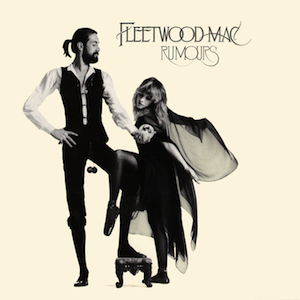
Eleven tracks of pure gold and gets a 100% rating. The album is stunning given all the conflict that raged as the band recorded. Every band member contributed brilliantly. Disdain drove passions and drugs fueled ferocity and creativity during the sessions. In the end, the real and raw emotion made beautiful music, which no one denies is still great. Best of the best tracks, in my humble opinion, include The Chain (the crazy linkage of broken, increasingly angry people trying to work together), Go Your Own Way (as a reminder of on-again, off-again attempts at shattered romance), and Second Hand News (unclear which past/present lover Buckingham had in mind as he sang, “One thing I think you should know, I ain’t gonna miss you when you go.”).
A Night at the Opera (Queen, 1975).
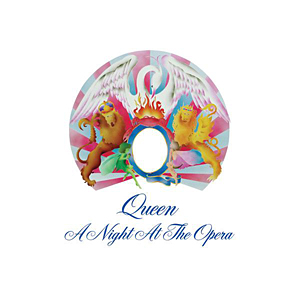
Sharing the top spot with a 100% rating is A Night at the Opera by Queen. The album has eleven tracks (I exclude God Save the Queen as it became a kind of signature during live performances) that dance all over the musical floor—opera, rock, skiffle, camp, pop, and jazz. From the unkind epistle Death on Two Legs to the six-minutes of magnificence that is Bohemian Rhapsody, it is Queen’s best ever and its musicians masterful in every way throughout.
American Pie (Don McLean, 1971)
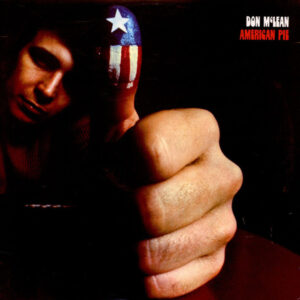
Despite its complicated, stream of consciousness lyrics, the title track of American Pie (Don McLean, 1971) is considered one of the best American songs of all time. The great news is that it is the first of nine remarkable tracks, thus, earning the album a 90% rating. The lyrical Van Gogh biopic, Vincent, the egotistical ranting of the ironic Everybody Loves Me, Baby, and the quieter Empty Chairs and The Grave give the listener much to contemplate in the depths of this album.
Led Zeppelin IV (Led Zeppelin, 1971)
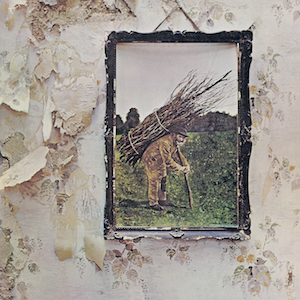
Next on the list with an 87.5 rating is Led Zeppelin IV (1971). Black Dog provides an explosive opening to an LP that absolutely rocks. Rock and Roll, Stairway to Heaven (no matter how much you hate that everyone has to prove they can play it), the history-inspired Battle of Evermore, and their rock-blues remake of Memphis Minnie’s When the Levee Breaks are proof that Zeppelin remains a musical force. Band members are considered among the greatest rock performers at their individual crafts and each proves his chops on the whole of this album.
Bridge Over Troubled Waters (Simon & Garfunkel, 1970)
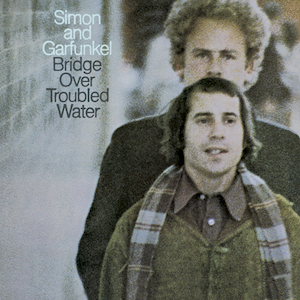
There is so much to like about elementary school friends Paul and Artie including tight harmonies, brilliant songwriting, and an exceptional blend of musical styles. Bridge Over Troubled Waters (Simon & Garfunkel, 1970) proved to be their last studio album, but the best selling US album for the years 1970, 1971, and 1972. Eight of its ten tracks (I exclude the live remake of Bye, Bye Love) are top notch and earns the album an 80% rating. The title track, which is Art Garfunkel at his sublime falsetto best, The Boxer (one of the best contemporary story-songs ever written), the latin American influenced El Condor Pass, and Cecilia (which inspired a college short story of mine—she’s still “breaking my heart” and “shaking my confidence daily”) are part of what make this LP amazing.
Innervisions (Stevie Wonder, 1973)
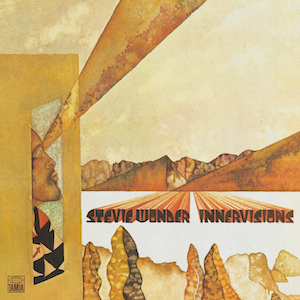
Few albums are as politically and socially conscious as Innervisions (Stevie Wonder, 1973). It deals with drug use, racism, politics, spirituality, and, of course, love—the very things make the world go round. Seven of nine tracks have made this album spin continuously on my turntable giving it a rating of 78%. Too High just plain grooves and Living for the City moves you to consider the life of a struggling inner city family. In Higher Ground and Jesus Children of America, Wonder wonders rhythmically about things spiritual in a very soulful way.



